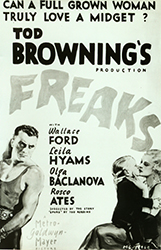
Tod Browning was born Charles Browning in Kentucky in 1882. Browning is admired and despised in equal measure amongst disabled people. He regularly used disabled actors but almost always in a 'negative' connotation. The majority of Browning's films were stories whose protagonists were criminals, often schemers, con men and thieves, and he almost always included 'freaks', who were his friends, in the cast. His best work was with the great Lon Chaney 'The Man of a Thousand Faces'.

In I 913 Browning met fellow Kentuckian D W Griffith, who took him under his wing and cast him as an undertaker in the two-reel comedy Scenting a Terrible Crime . After a car crash which killed his passenger - film actor Elmer Booth - he was cast by Griffith as a car-owner for a contemporary sequence in Intolerance (1916). Griffith also made him an assistant director on the film. After directing some routine melodramas, Browning persuaded Irving Thalberg at MGM to produce his pet project The Unholy Three (1925),a melodrama about a trio of crooks: a transvestite ventriloquist (Lon Chaney), a midget jewel thief (Harry Earles , also cast in Freaks) and a strongman (VictorMcLaglen). The film was a major box office success and established Browning as a top director in the industry. He went on to make The Blackbird (1926) in which hehas a 'kindly cripple' run a rescue mission; The Unknown (1927) about a fake armless knife- thrower who has his arms amputated because of his lover's fear of being embraced; and West of Zanzibar (1928) again starring Lon Chaney in the tale of an English music-hall magician who becomes. paralysed, earning the nickname 'Dead Legs', after an altercation with his wife's lover, played by Lionel Barrymore.
Ater the success of Dracula (1930), Browning made Freaks ( I 932) and the controversy around this film effectively ended his status as a director who could choose his projects. The film was banned in the UK until 1963. One of Browning's last films was The Devil-Doll (1936), which suffered severe script changes as Britain requested the removal of all black characters fearing it would create racial tensions in the UK. The film stars Lionel Barrymore - in drag and on crutches - employing 'miniaturised people' to wreak revenge on old associates. Significantly, Erich von Stro heim has a credit for the screenplay. Browning retired from filmmaking soon after and died in 1962 from throat cancer - the same condition that had killed his great friend Lon Chaney.
The Devil Doll
Crutches, Deformiity D: Tod Browning Lionel Barrymore, Maureen O'Sullivan
USA-1936 • bw• 79 mins • 35mm • Horror
A refugee from Devil's Island disguises himself as an old lady who sells human dolls which then murder those responsible for his imprisonment.
Freaks
Abnormality
D: Tod Browning
Harry Earles, Olga Baclanova, Wallace Ford
USA-1932 • bw• 62 mins • 3 5mm- Drama
A group of circus 'freaks' take revenge on a female trapeze artist and her strong m an lover after she has married a midge for his fortune. Deeply controversial in its day, it has taken decades to be recognised as a masterpiece of compassion and pitch-black humour.
Intolerance
D: D W Griffith
Tod Browning, Lillian Gish USA -1 916- bw-
160 mins at 18 fp s -16 mm- Drama
Four separate stories of humankind's struggle against intoler ance through the ages. Tod Browning appears as a car owner in a contemporary scene, and was also an assistant director on the film.

